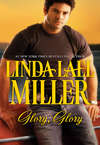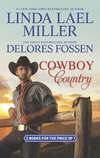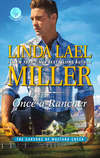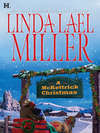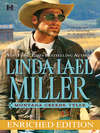Czytaj książkę: «Glory, Glory»
Glory, Glory
New York Times Bestselling Author
Linda Lael Miller

Eight years ago, Glory Parsons had been forced to flee her hometown—and leave behind her first love. And Jesse Bainbridge would never know the heartbreaking price she’d paid—or about the child born of their fiery union….
Jesse had once wanted Glory with all the passion in his soul—until she walked out on him. Now she was back with shocking news that would change his life forever. Could he trust the woman who’d betrayed him—the only woman he would ever love?
For Betty Wojcik, a friend indeed.
Thanks for everything.
Contents
Chapter One
Chapter Two
Chapter Three
Chapter Four
Chapter Five
Chapter Six
Chapter Seven
Chapter Eight
Chapter Nine
Chapter Ten
Chapter Eleven
One
Glory Parsons’s gloved hands tightened on the steering wheel when the familiar green-and-white sign came into view. Pearl River, Oregon. Population: 6710.
All it would take was one U-turn, and she could be headed back toward Portland. She’d find another job, and she still had her apartment. Maybe she and Alan could work things out….
She swallowed hard. She would be in Pearl River three weeks at the outside, then she could join her friend Sally in San Francisco, get a new job and start her life all over again. As for Alan, she hoped his teeth would fall out.
The feed store was festooned in lights and sparkling green garlands for Christmas, like the five-and-dime and the bookstore and the newspaper office. The street was thick with muddy slush, but fat puffs of new snow were falling.
Glory passed the diner and smiled to see the cheap plastic Santa and reindeer perched on the tar-paper roof. She touched her horn once, in a preliminary greeting to her mother, and drove on.
The cemetery was on the other side of town, overlooking the river. Glory parked outside the gates, behind a green police car, and made her way up the curving driveway. She left her purse in the car, carrying a bouquet of holly she’d picked along the roadside earlier in the day.
A crisp breeze riffled the drifting snowflakes and Glory’s chin-length silver-gold hair. She pulled up the collar of her long woolen coat, royal blue to match her eyes, and made her way carefully along a slippery walk.
Dylan’s grave lay beneath a white blanket of snow, and Glory’s throat thickened when she came to stand beside it. “Hi, handsome,” she said hoarsely, stooping to put the holly into the metal vase at the base of his headstone. Her eyes filled with tears, and she wedged both hands deep into her coat pockets and sniffled. “You had your nerve, dying at twenty-two. Don’t you know a girl needs her big brother?”
She dusted snow from the face of the stone, uncovering Dylan’s name and the dates of his birth and death. He’d perished in an explosion soon after joining the air force, and Glory didn’t want anyone to forget he’d lived, even for the space of an afternoon snowfall.
She drew a deep breath and dried her eyes with the back of one hand. “I swore I’d never come back here,” she went on miserably, “even to see you. But Mama’s getting married, so I had to come to her wedding.” She took a tissue from her pocket and dabbed at her nose. “I got myself hooked up with a real jerk back in Portland, Dylan. If you’d been around, you probably would have punched him in the mouth. He pretended to love me, and then he stole my promotion right out from under me.”
She paused to look up at the cloudy sky. The bare limbs of maple and elm trees seemed to splinter it.
“I quit my job and had my furniture put in storage,” Glory confided to her brother, gazing at the marble headstone again. “And after Christmas and Mama’s wedding, I’m going to San Francisco to make a life for myself. I don’t know when I’ll be back to see you again.”
A swishing sound in the slush alerted Glory to someone’s approach. She looked up, and her blue eyes went wide.
“Jesse.”
He was standing on the other side of Dylan’s grave, dressed in the standard green-and-brown uniform of the sheriff’s department. He wore no hat, and his badge, pinned to his jacket, gleamed in the thin winter light. Like Glory, he was twenty-eight years old.
His caramel eyes moved over her frame then swept back to her face. “What are you doing here?” he asked, as though he’d caught her in a bank vault after-hours.
Glory had known she couldn’t come back to Pearl River without encountering Jesse—she just hadn’t expected it to happen this soon. Her temper flared, along with an old ache in a corner of her heart she’d long since closed off, and she gestured toward Dylan’s headstone. “What do you think I’m doing here?” she retorted. “I came to see my brother.”
Jesse hooked his thumbs through the loops on his trousers, and his brazen brown eyes narrowed slightly. “It’s been eight years since the funeral. You were really anxious to get back.”
Eight years since the funeral, eight years since Glory had laid eyes on Jesse Bainbridge.
Pride forced Glory to retaliate. She took in his uniform and then said, “I see you’ve been promoted to sheriff. Did your grandfather buy the election?”
His jawline tightened for a moment, but then he grinned in that wicked way that had broken so many hearts in high school. “Why not? He bought you, didn’t he?” Like everyone else in Pearl River, Jesse probably believed old Seth Bainbridge had paid her to leave town; Glory was fairly certain he’d never learned about the baby.
Without waiting for a reply, Jesse settled his hat on his head and walked away.
Glory barely resisted the urge to scoop up a handful of snow and hurl it at his back. Only the awareness of where she was kept her from doing just that.
When Jesse was out of earshot, Glory put her hands on her hips and told Dylan, “He really burns me up. I don’t know why you liked him so much.”
You liked him, too, she heard Dylan’s voice say, way down deep in her heart. You had his baby, Glory.
“Don’t remind me!” Glory snapped, folding her arms. “I was barely eighteen, and my hormones were out of control!”
She thought she heard Dylan’s laughter in the chilly winter breeze, and in spite of the unpleasant encounter with Jesse Bainbridge a few minutes before, she smiled.
“I love you, Dylan,” she said, touching the headstone again. Then, with her hands in her pockets, she turned and made her way down the walk to the driveway and the towering wrought-iron gates.
It was time to face Pearl River, something she hadn’t done since Dylan’s funeral, and she was reluctant for more than one reason.
Glory’s sports car, the one great extravagance in her life, started with a comforting roar, and she drove slowly back into town, telling herself to take things one moment at a time. Before she knew it, Christmas and the New Year’s wedding would be over, and she could get on with her life.
She parked in front of Delphine’s Diner just before an orange snowplow came past, flinging a picturesque fan of slush at the sidewalk. Glancing up at the life-size plastic Santa and reindeer, Glory remembered Dylan sliding around on the roof to put them in place for Christmases past, deliberately clowning because he knew his mother and sister were afraid he’d fall.
The little bell over the door jingled when Glory went inside. Her mother, as slender and active as ever, lit up brighter than the Santa over their heads when she saw her daughter.
“Glory,” she whispered with a choked sob of pleasure. And then she was hurrying across the brown-and-white linoleum floor, with its swirls of fresh wax, to embrace her.
The hug brought a lump to Glory’s throat and quick tears to her eyes. “Hello, Mama.”
“It’s about time you got here,” boomed a male voice from one of the stools at the counter. Harold Seemer, the good-natured plumbing contractor who had finally persuaded Delphine to marry him after a five-year courtship, beamed at his future stepdaughter. “We were about to send the sheriff’s patrol out after you.”
Glory tried not to react visibly to the indirect mention of Jesse. She didn’t want thoughts of him interfering with her visit. “Hi, Harold,” she said, giving the well-fed balding man a hug. He and Delphine had visited her in Portland on several occasions, and she’d become very fond of him.
“You look skinny,” Delphine commented, narrowing her green eyes as Glory took off her coat and hung it on one of the chrome hooks beside the door.
Glory laughed. “Thanks, Mama. I’ve been dieting for two months to make up for all the food you’re going to force me to eat.”
Harold finished his coffee and replaced the beige china cup in its saucer, with a clink. “Well, I’ve got to get back to work. I’ll leave you two to catch up on everything.”
When he was gone, Glory took a stool at the counter, sighed, and pushed back her hair. “No customers,” she commented, looking around at the six Formica-topped tables. The chrome legs of the chairs glistened, and so did the red vinyl seats.
Delphine shrugged and, stepping behind the counter, poured a cup of coffee to set in front of her daughter. “The lunch crowd’s been and gone. Things’ll be quiet until dinnertime.”
Glory reached for her cup and saucer and pulled them toward her, feeling the steam caress her face and taking comfort in the familiar aroma, but she didn’t drink. “I saw Jesse,” she said, and her voice was shaky.
“Did you, now?” Delphine’s voice was light as the feathery snow falling past the window with its neon “We Serve Pepsi-Cola” sign. “How did that happen?”
“I stopped by the cemetery to leave some holly for Dylan, and he was there.” Glory raised her eyes, watched her mother’s face pale slightly at the mention of her lost son. But Delphine recovered her composure rapidly, like always. She was nothing if not a survivor.
“Jesse’s brother, Gresham, is buried there, along with his sister-in-law, Sandy, and his folks. Must be some special day to him, or something.”
Glory recalled the plane crash that had taken the lives of Gresham Bainbridge, promising young state senator, and his pretty wife, Sandy. The tragedy had been big news in Oregon. “They left a child behind, didn’t they?” Glory asked, because thinking about the Bainbridges’ misfortune was better than remembering her own and Delphine’s.
Delphine busied herself rinsing out a glass pot and starting a new batch of decaffeinated coffee brewing. “A little girl,” she said quietly. After a few more moments, she turned to face her daughter, leaning against the spotless counter, her shrewd eyes inviting—even demanding—confidences. “Tell me about this Alan man. What did he do that made you uproot yourself like that?”
Glory ran her tongue over her lips and fiddled with a paper napkin. She still hadn’t touched her coffee. “He was a rat, Mama,” she answered after a long time. “He cozied up to all my clients while I was away taking a training course in Chicago, and when I came home, the board had given him the promotion they promised me.”
“So you just threw your resignation in their faces, cleared out your desk and left?” Delphine put the question in a non-challenging way, but it still made Glory’s cheeks flame.
And she definitely felt defensive. “What should I have done, Mama? Stayed and brought Alan pencils and files in my teeth? I worked night and day for four years to earn that job!”
Delphine shrugged, leaning on the counter again. “I think maybe you just wanted out of the relationship and that was the best excuse that occurred to you. In fact, I wouldn’t be surprised to learn that you’ve never gotten over Jesse Bainbridge.”
Glory’s hands shook as she picked up the coffee and took an angry gulp. It burned her tongue and the roof of her mouth. “Well, I have!” she sputtered moments later. It still hurt that Jesse hadn’t come for her at the unwed-mothers’ home in Portland and brought her home to have their baby, even though she knew the scenario was woven of pure fantasy. Jesse couldn’t have come for her because he hadn’t known she was pregnant. “It was nothing but a childish high-school infatuation in the first place.”
Delphine’s eyes took on a sad look. “It was more than that,” she insisted softly, resting one well-manicured hand on Glory’s arm.
Glory pulled away, went to the jukebox and busied herself studying the titles of the songs imprisoned inside. They were all old tunes she couldn’t bear to hear when her feelings were so raw.
She turned to the window instead.
Mr. Kribner came out of the drugstore across the street and hung an evergreen wreath on his front door.
“Merry Christmas,” Glory muttered, wishing she’d never left Portland. She could have made some excuse for the holidays, then dashed into town for the wedding and out again after the reception.
Her mother’s hands gripped her elbows firmly. “You’re tired, sweetheart, and I’ll bet you didn’t have any lunch. Let me fix you something, and then you can go upstairs and rest a while.”
Glory nodded, even though she had no appetite and hadn’t really rested for days. She didn’t want Delphine to worry about her, especially during this happy time, with the wedding and the holidays coming up.
“Harvey Baker was just in the other day,” Delphine called sunnily from the kitchen, as Glory stood hugging herself and watching the snow swirl lazily past the diner windows. When it got dark, the Pepsi sign would make a pink glow on the white ground. “He’s looking for an assistant over at the bank, you know. Allie Cordman left to take a job in Seattle.”
“Smart girl,” Glory murmured. Pearl River was a nowhere town, with nothing to offer. Anybody who deliberately made his home here ought to have his head examined.
Delphine hummed in the kitchen, happy with her world, and for one difficult moment Glory envied her profoundly. She wondered what it was like to be in love with a man she could trust and depend on, and to be loved by him in return.
Presently, Glory’s favorite lunch—a clubhouse sandwich with potato salad—appeared on the counter, along with a tall diet cola with extra ice.
Glory would have sworn she wasn’t hungry, but her stomach grumbled as she got back onto the stool and pulled a fresh napkin from the holder. “Thanks, Mama,” she said.
Delphine was busy wiping the already immaculate counter. “There’s an old-movie festival at the Rialto tonight,” she told Glory cheerfully. “Jimmy Stewart in It’s a Wonderful Life and Cary Grant in The Bishop’s Wife.”
A poignant sensation of nostalgia came over Glory. “Jimmy Stewart and Cary Grant,” she sighed. “They don’t make men like that anymore.”
Delphine’s green eyes twinkled, and she flashed her diamond engagement ring. “Don’t be too sure,” she said coyly, and Glory laughed.
“Mama, you’re hopeless!” But she couldn’t help thinking, as she ate her sandwich and tangy potato salad, that it would be nice to have a handsome angel turn up in her life, the way Cary Grant had appeared in Loretta Young’s.
Two teenage boys came in, raising a great ruckus lest they go unnoticed, and plunked quarters into the jukebox. A lively old Christmas rock tune filled the diner, and they piled into chairs at one of the tables.
Suddenly wanting to relive her after-school waitress days in that very diner, Glory abandoned her sandwich and reached for a pencil and an order pad.
“What’ll it be, guys?” she asked.
The young men ran appreciative eyes over her trim blue jeans and gray cashmere sweater.
“Will you marry me?” asked the one with braces.
Glory laughed. “Sure. Just bring a note from your mother.”
The other boy hooted at that, and the first one blushed. The name on the sleeve of his letter-man’s jacket was Tony.
“I want a cheeseburger, a vanilla shake and an order of curly fries,” he said, but the look in his eyes told Glory he had bigger things in mind than food.
Glory was writing the order down when the bell over the door jingled. She looked up to see Jesse dusting snow off his shoulders onto Delphine’s clean floor.
His gaze skirting Glory as though she’d suddenly turned invisible, he greeted the boys by name and took a place at the counter. “Hi, Delphine,” he said, as the woman poured his coffee. “How’s my best girl?”
Glory concentrated fiercely on the second boy’s order, and when she’d gotten it, she marched into the kitchen and started cooking. She had to keep herself busy—and distracted—until Jesse finished his coffee and left the diner.
“What’s he doing here?” she whispered to her mother, when Delphine joined her to lift the basket out of the deep fryer and shake the golden fries free of grease.
Delphine smiled. “He’s drinking coffee.”
Glory glowered at her. “I’m going upstairs!” she hissed.
“That’ll fix him,” Delphine said.
In a huff, Glory took the cheeseburgers off the grill and the shakes off the milk-shake machine. She made two trips to the boys’ table and set everything down with a distinctive clunk. All the while, she studiously ignored Jesse Bainbridge.
He’d just come in to harass her, she was sure of that. He probably bullied everybody in Pearl River, just like his grandfather always had.
The jukebox took a break, then launched into a plaintive love song. Glory’s face was hot as she went back to the kitchen, hoping Jesse didn’t remember how that tune had been playing on the radio the first time they’d made love, up at the lake.
She couldn’t help glancing back over one shoulder to see his face, and she instantly regretted the indulgence. Jesse’s bold brown eyes glowed with the memory, and his lips quirked as he struggled to hold back a smile.
Glory flushed to recall how she’d carried on that long-ago night, the pleasure catching her by surprise and sending her spiraling out of her small world.
“That does it,” she muttered. And she stormed out to her car, collected her suitcase and overnighter, and marched up the outside stairs to her mother’s apartment.
The moment she stepped through the door, Glory was awash in memories.
The living room was small and plain, the furniture cheap, the floor covered in black-and-beige linoleum tiles. A portable TV with foil hooked to the antenna sat on top of the old-fashioned console stereo.
Glory put down her luggage, hearing the echoes of that day long, long before, when Delphine had taken a job managing the diner downstairs. Dylan had been fourteen then, Glory twelve, and they’d all been jubilant at the idea of a home of their own. They’d lived out of Delphine’s old rattletrap of a car all summer, over at the state park next to the river, but the fall days were getting crisp and the nights were downright cold.
Besides, Delphine’s money had long since run out, and they’d been eating all their meals in the church basement, with the old people and the families thrown out of work because of layoffs at the sawmill.
Dylan and Glory had slept in bunk beds provided by the Salvation Army, while Delphine had made her bed on the couch.
Pushing the door shut behind her, Glory wrenched herself back to the present. It was still too painful to think about Dylan twice in one day, even after all the time that had passed.
Glory put her baggage in the tiny bedroom that was Delphine’s now, thinking that she really should have rented a motel room. When she’d suggested it on the telephone, though, her mother had been adamant: Glory would stay at the apartment, and it would be like old times.
She paced, too restless to unpack or take a nap, but too tired to do anything really demanding. After peeking out the front window, past the dime-store wreath with the plastic candle in it, to make sure Jesse’s car was gone, she went back downstairs for her coat.
The cook who took Delphine’s place at two-thirty had arrived, along with a teenage waitress and a crowd of noisy kids from the high school.
Delphine handed Glory her coat, then shrugged into her own. “Come on,” she said, pushing her feet into transparent plastic boots. “I’ll show you the house Harold and I are going to live in.”
The snow fell faster as the two women walked along the familiar sidewalk. Now and then, Delphine paused to wave at a store clerk or a passing motorist.
They rounded a corner and entered an attractive development. The houses had turrets and gable windows, though they were modern, and the yards were nicely landscaped.
Glory remembered playing in this part of town as a child. There had been no development then, just cracked sidewalks that meandered off into the deep grass. The place had fascinated her, and she’d imagined ghost houses lining the walks, until Dylan had spoiled everything by telling her there had been Quonset huts there during World War II to accommodate workers at the town smelter.
Delphine stopped to gaze fondly at a charming little mock colonial with a snow-dusted rhododendron bush growing in the yard. The house itself was white, the shutters dark blue. There were flower boxes under all the windows.
Glory’s eyes widened with pleasure. This was the kind of house her mother had always dreamed of having. “This is it?” she asked, quite unnecessarily.
Proudly Delphine nodded. “Harold and I signed the papers on Friday. It’s all ours.”
Impulsively, Glory hugged her mother. “You’ve come a long way, baby!” she said, her eyes brimming with happy tears.
Both of them stood still in the falling snow, remembering other days, when even in their wildest dreams neither of them would have dared to fantasize about owning a house such as this one.
“Are you going to keep the diner?” Glory asked, linking her arm with Delphine’s as they walked back toward the center of town.
Delphine’s answer came as no surprise. After all, she’d worked and scrimped and sacrificed to buy the place from her former employers. “Of course I am. I wouldn’t know what to do if I couldn’t go down there and make coffee for my customers.”
With a chuckle, Glory wrapped her arm around her mother’s straight little shoulders. “I imagine they’d all gather in your kitchen at home, they’re so used to telling you their troubles over a steaming cup.”
Back at the apartment, Delphine immediately excused herself, saying she had to “gussy up” for the Stewart-Grant festival at the Rialto.
“Sure you don’t want to come along?” she queried, peering around the bathroom door, her red hair falling around her face in curls. “Harold and I would be glad to have you.”
Glory shook her head, pausing in her unpacking. “I feel as though parts of me have been scattered in every direction, Mama. I need time to gather myself back together. I’ll get something light for supper, then read or watch TV.”
Delphine raised titian eyebrows. “You’re getting boring in your old age, kid,” she said. “Just see that you don’t eat over at Maggie’s. Last week one of the telephone linemen told me he got a piece of cream pie there that had dust on top of it.”
“I wouldn’t think of patronizing your archrival, Mama,” Glory replied, grinning. “Even though I do think serving pie with dust on it requires a certain admirable panache.”
Delphine dismissed her daughter with a wave and disappeared behind the bathroom door.
As it happened, Glory bought spaghetti salad in the deli at the supermarket and ate it while watching the evening news on the little TV with the foil antenna. Downstairs in the diner, the dinner hour was in full swing, and the floor vibrated with the blare of the jukebox.
Glory smiled and settled back on the couch that would be her bed for the next several weeks, content.
She was home.
After the news was over, however, the reruns of defunct sitcoms started. Glory flipped off the TV and got out her mother’s photo albums. As always, they were tucked carefully away in the record compartment of the console stereo, along with recordings by Roy Orbison, Buddy Holly, Ricky Nelson and Elvis Presley.
Delphine probably hadn’t looked at the family pictures in years, but Glory loved to pore over them.
Still, she had to brace herself to open the first album—she was sitting cross-legged on the couch, the huge, cheaply bound book in her lap—because she knew there would be pictures of Dylan.
He smiled back at her from beside a tall man wearing a slouch hat. Glory knew the man’s name had been Tom, and that he’d been mean when he drank. He’d also been her father, but she didn’t remember him.
The little boy leaning against his leg, with tousled brown hair and gaps in his grin, was another matter. Gently, with just the tip of one finger, Glory touched her brother’s young face.
“When am I going to get over missing you, Bozo?” she asked, in a choked voice, using the nickname that had never failed to bug him.
Glory stared at Dylan for a few more moments, then turned the page. There she made her first photographic appearance—she was two months old, being bathed in a roasting pan on a cheap tabletop, and her grin was downright drunken.
She smiled and sighed. “The body of a future cheerleader. Remarkable.”
Her journey through the past continued until she’d viewed all the Christmases and Halloweens, all the birthdays and first days of school. In a way, it eased the Dylan-shaped ache in her heart.
When she came to the prom pictures of herself and Jesse, taken in this very living room with Delphine’s Kodak Instamatic, she smiled again.
Jesse was handsome in his well-fitting suit, while she stood proudly beside him in the froth of pink chiffon Delphine had sewn for her. The dress had a white sash, and she could still feel the gossamer touch of it against her body. Perched prominently above her right breast was Jesse’s corsage, an orchid in the palest rose.
She touched the flat, trim stomach of the beaming blond girl in the picture. Inside, although Glory hadn’t known it yet, Jesse’s baby was already growing.
Glory closed the album gently and set it aside before she could start wondering who had adopted that beautiful little baby girl, and whether or not she was happy.
The next collection of pictures was older. It showed Delphine growing up in Albuquerque, New Mexico, and there were photographs of a collage of aunts, uncles and cousins, too.
Glory reflected as she turned the pages that it must have been hard for Delphine after she left another abusive husband. Her family had understood the first time, but they couldn’t forgive a second mistake. And after Delphine fled to Oregon with her two children, she was virtually disowned.
Saddened, Glory turned a page. The proud, aristocratic young face of her Irish great-grandmother gazed out of the portrait, chin at an obstinate angle. Of all the photographs Delphine had kept, this image of Bridget McVerdy was her favorite.
In 1892, or thereabouts, Bridget had come to America to look for work and a husband. She’d been employed as a lowly housemaid, but she’d had enough pride in her identity to pose for this picture and pay for it out of nominal wages, and eventually she’d married and had children.
The adversities Bridget overcame over the years were legion, but Delphine was fond of saying that her grandmother hadn’t stopped living until the day she died, unlike a lot of people.
Glory gazed at the hair, which was probably red, and the eyes, rumored to be green, and the proud way Bridget McVerdy, immigrant housemaid, held her head. And it was as though their two souls reached across the years to touch.
Glory felt stronger in that moment, and her problems weren’t so insurmountable. For the first time in weeks, giving up didn’t seem to be the only choice she had.
Darmowy fragment się skończył.
